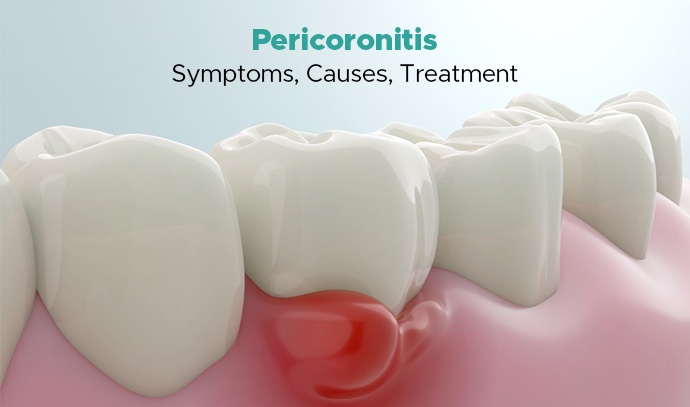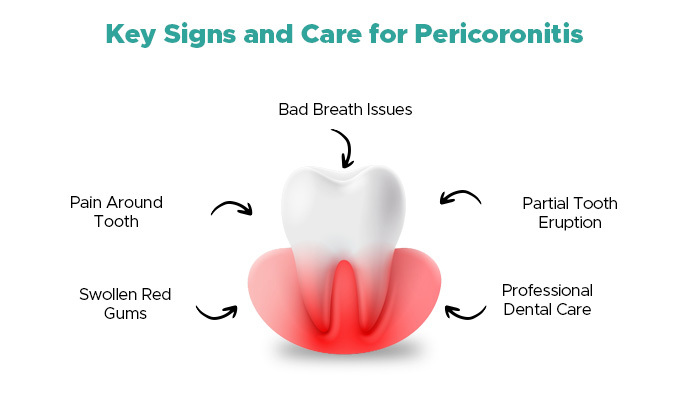
Pericoronitis – Symptoms, Causes, Treatment
Pericoronitis is a common dental issue that can cause significant discomfort if not addressed promptly. It occurs when the gum tissue around a partially erupted tooth, often a wisdom tooth, becomes inflamed or infected. This condition can lead to swelling, pain and difficulty in chewing, making daily activities uncomfortable. Understanding the pericoronitis symptoms, causes and treatment options is essential to prevent complications and maintain oral health.
In this guide, we’ll explore everything you need to know about pericoronitis, including how it develops, how dentists treat it, what to expect during the process and why timely intervention matters. Read on to learn how you can effectively manage this condition and regain a healthy, pain-free smile.
Understanding Pericoronitis
Pericoronitis is an inflammation of the gum tissue surrounding a partially erupted tooth. Most commonly it affects wisdom teeth in the late teens or early twenties. When a tooth does not fully emerge the flap of gum covering it known as an operculum can trap food and bacteria. This leads to infection, swelling and discomfort.
Understanding pericoronitis symptoms early is crucial. Ignoring the condition can result in severe pain, difficulty in opening the mouth and even systemic infections if the bacteria spread.

Pericoronitis Symptoms You Should Watch For
Recognizing the symptoms early allows for timely treatment and prevents complications. Common pericoronitis symptoms include:
- Pain and tenderness: Often around the partially erupted tooth increasing while chewing.
- Swollen gums: Inflamed tissue near the affected tooth sometimes with redness.
- Bad breath or taste: Due to trapped food particles and bacterial infection.
- Difficulty opening the mouth: In severe cases jaw stiffness may occur.
- Fever and malaise: Infections can occasionally cause mild fever and general discomfort.
If you notice any of these signs then visiting a dental clinic in Calicut promptly can prevent worsening of the condition.
Understanding the Causes of Pericoronitis
Pericoronitis typically arises due to a combination of anatomical and hygiene-related factors. Knowing the pericoronitis causes can help in prevention and management:
- Partial tooth eruption: The gum flap over partially erupted wisdom teeth traps food and bacteria.
- Poor oral hygiene: Difficulty cleaning around wisdom teeth increases infection risk.
- Bacterial infection: Common oral bacteria multiply in trapped debris causing inflammation.
- Impacted teeth: Teeth that fail to align correctly with the dental arch can exacerbate gum irritation.
- Stress or weakened immunity: Conditions affecting immune response can increase susceptibility to gum infections.
By understanding these causes, you can take preventive measures and seek treatment before complications arise.
How Pericoronitis Treatment Works
Effective pericoronitis treatment depends on the severity of the infection and the patient’s overall oral health. Treatment is aimed at relieving pain reducing infection and preventing recurrence.
1. Initial Management
Mild cases may respond to conservative measures:
- Oral rinses: Antibacterial mouthwashes help reduce bacterial load.
- Pain management: Over-the-counter painkillers alleviate discomfort.
- Saltwater rinses: Promote healing and reduce gum inflammation.
2. Professional Dental Intervention
Moderate to severe pericoronitis requires professional care at a dental hospital in Kannur or any trusted dental clinic. Treatment options include:
- Debridement: Cleaning the area under the gum flap to remove trapped debris.
- Antibiotics: Prescribed if the infection has spread or caused systemic symptoms.
- Operculectomy: Surgical removal of the gum flap if recurrent infections occur.
- Extraction: Removal of the problematic tooth often recommended for impacted wisdom teeth.
3. Recovery and Follow-up
- Short recovery time: Most patients experience relief within a few days to a week post-treatment.
- Post-treatment care: Maintaining oral hygiene and attending follow-up visits prevent recurrence.
- Monitoring: Regular check-ups ensure that healing progresses without complications.
Step-by-Step Care for Pericoronitis
For patients, knowing the treatment process can ease anxiety. Here’s a typical approach:
- Initial Consultation: Dentist evaluates the affected area performs X-rays if necessary.
- Symptom Relief: Painkillers and antiseptic rinses are prescribed to manage discomfort.
- Cleaning and Debridement: Removal of trapped food particles and bacteria under the gum flap.
- Surgical Intervention (if required): Operculectomy or tooth extraction based on severity.
- Follow-up Care: Regular monitoring oral hygiene instructions and check-ups ensure full recovery.
Cost and Duration of Pericoronitis Treatment
Treatment costs and timelines vary depending on the severity and type of intervention. Here’s a general overview:
| Treatment Type | Duration | Average Cost (INR) | Includes |
|---|---|---|---|
| Conservative Care | 1–2 weeks | 500–1,500 | Cleaning, rinses, pain relief |
| Antibiotic Therapy | 5–7 days | 800–1,500 | Prescription meds, follow-up visit |
| Operculectomy | 30–60 mins | 3,000–5,000 | Local anesthesia, minor surgery |
| Wisdom Tooth Extraction | 1–2 hours | 5,000–10,000 | X-rays, anesthesia, post-op care |
These costs are indicative and may vary based on the clinic procedure complexity and follow-up requirements.
Why Choose Elite Dental Studio
Selecting the right dental clinic ensures safe, effective and comfortable care for pericoronitis. Elite Dental Studio offers:
- Advanced Technology: Modern imaging and surgical tools for precise treatment.
- Experienced Dentists: Skilled professionals with years of experience in managing pericoronitis and wisdom tooth complications.
- Patient-Centric Approach: Personalized care, pain management and clear guidance through each step.
- Convenient Location: Easily accessible for patients seeking a trusted dental clinic in Calicut or dental hospital in Kannur.
Choosing the right clinic ensures timely intervention and reduces the risk of complications helping you maintain optimal oral health.
Book Your Appointment for the Best Dental Care in Calicut Now!
Pericoronitis may begin with mild discomfort, but ignoring it can lead to swelling, pain and more serious dental problems. By recognizing the pericoronitis symptoms, understanding the causes and seeking timely treatment, you can prevent complications and maintain healthy gums.
Early intervention, whether through simple cleaning, antibiotics or minor surgical procedures, ensures faster relief and a smoother recovery. Maintaining proper oral hygiene and regular dental check-ups further reduces the risk of recurrence.
For safe and effective care, Elite Dental Studio, a trusted dental clinic in Calicut and dental hospital in Kannur, offers personalized treatment designed to restore comfort and protect your oral health.
Take control today and ensure a pain-free, healthy smile. Book your appointment to get expert guidance and treatment tailored to your needs.
Frequently Asked Questions:
What are the common symptoms of pericoronitis?
Ans. Pericoronitis is a condition that inflames the area around a partially erupted tooth. Pain, tenderness, bad breath, difficulty opening the mouth and sometimes fever are some of the signs that pericoronitis develops. Prevention of complications is made possible by early recognition of these symptoms.
What causes pericoronitis?
Ans. Basically, pericoronitis results when a partially grown tooth is surrounded by a gum that traps both food and bacteria. Necessary actions like oral hygiene, removing the impacted teeth and taking care of the immune system and avoiding bacterial infections can prevent pericoronitis from happening.
How is pericoronitis treated?
Ans. The cure of this disease depends on its severity. Relief medicines, antiseptic mouth rinses and saltwater rinses can do gentle cases. Severe cases may require a dentist to clean the area thoroughly, give you antibiotics that cut the gum flap (operculectomy) or remove the tooth.
How long does pericoronitis treatment take?
Ans. Time for recovery is usually a few days if it is a mild case and more than a week in case of operative interventions. The doctors’ visits after a surgery help to check if the healing is complete and the issue is not coming back.
Where can I get reliable treatment for pericoronitis?
Ans. The best place for safe and effective treatment of pericoronitis and other dental problems is either Elite Dental Studio, a dental clinic you can rely on in Calicut or a dental hospital in Kannur, where the dentists are highly skilled and treat you as an individual.
Have Dental Problem : Call us
CALICUT: +91 9745 072 555,
KOCHI: +91 9567 124 888
KANNUR: +91 9645874777
or make an Appointment
Take a smiling selfie and we'll Simulate your new smile See What Invisalign treatment could do for you!




